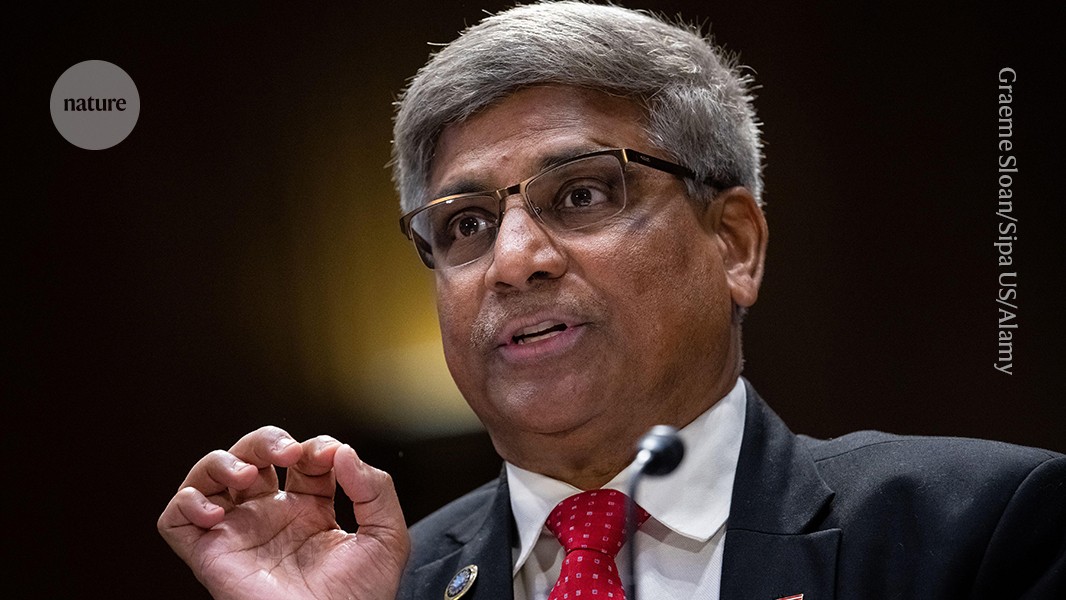Hundreds more NSF grants terminated after agency director resigns

Sethuraman Panchanathan abruptly leaves helm of US funding agency after Elon Musk’s DOGE arrives

Sethuraman Panchanathan resigned Thursday as director of the US National Science Foundation.Credit: Graeme Sloan/Sipa US/Alamy
Fresh turmoil has hit the US National Science Foundation (NSF): hundreds more of the agency’s research grants were terminated today on top of the hundreds already terminated last week, Nature has learnt. The new terminations come one day after the agency’s director abruptly resigned and NSF staff members were offered incentives to retire early due to “future restructuring, staffing reductions, and constrained budget environments”.
The departing director, Sethuraman Panchanathan, was appointed as head of one of the world’s leading funders of basic research by US President Donald Trump in 2019 during his first term in office.
But Trump, now in office for a second time, allegedly wants to cut the agency’s US$9-billion budget by 55% and its workforce by 50%, according to Science. In a farewell letter to staff, Panchanathan wrote, “I believe that I have done all I can to advance the mission of the agency”, adding, “while NSF has always been an efficient agency, we still took the challenge of identifying other possible efficiencies”.
Nature spoke with seven NSF staff members for this story. All requested anonymity because they are not authorized to speak with the press. Staffers said they were stunned by Panchanathan’s sudden departure. “I respect him more for deciding to resign and not signing the agency’s death warrant,” says one NSF staffer.
Neal Lane, a former NSF director under Democratic president Bill Clinton, offered praise for Panchanathan, who goes by ‘Panch’. “Panch has done an outstanding job” amid the effort to “diminish NSF’s role in science, education and pretty much everything else”, Lane says. The US National Science Board, which governs the NSF, praised Panchanathan in a statement as “fantastic”.
Asked for comment, an NSF spokesperson referred Nature to Panchanathan’s farewell letter. The spokesperson said that Brian Clark, the NSF’s chief of staff, will serve as director until the White House appoints a permanent replacement and the US Senate confirms them. The White House Office of Science and Technology Policy, which oversees the NSF, did not respond to a request for comment.
Crisis mode
Since Trump, a Republican, took office, the NSF has frozen and unfrozen grants, fired and rehired employees and cut its graduate research fellowship programme from about 2,000 positions to 1,000. The latest bout of upheaval began on 17 April, when NSF staff members were given guidance for receiving “VIP visitors” from the Department of Governmental Efficiency (DOGE), an initiative led by Trump ally Elon Musk to reduce federal spending and shrink the federal workforce.
The guidance said that in the event of a request that “violates or doesn’t follow proper procedures”, employees were to contact Dorothy Aronson, the NSF’s chief information officer. “Do not give any indication that the request will be denied,” the guidance statement noted. Two members of DOGE, Luke Farritor and Zachary Terrell, were quickly given complete access to NSF grant-management systems despite statements in the guidance to staffers that they should initially receive read-only access. The guidance to NSF employees was first reported by FedScoop, a government technology media publication, and confirmed by Nature.
On 18 April, after the arrival of three DOGE staffers at NSF headquarters in Alexandria, Virginia, the agency halted the funding of any new research grants for a week. The agency has now started issuing the grants again, but has issued only 377 for April, compared with 863 in April last year.
The same day, the NSF began terminating research grants that had already been awarded, apparently under orders from DOGE. An internal list obtained by Nature shows that the NSF has axed at least 387 awards worth $237 million, of which roughly 45% has already been spent. Over one-third of these, or 152 grants, had been awarded by the NSF’s directorate of education. The numbers match crowdsourced data compiled in an online database by Scott Delaney, an epidemiologist at the Harvard T. H. Chan School of Public Health in Cambridge, Massachusetts, and Noam Ross, a computational ecologist based in Brooklyn, New York, who is executive director of rOpensci, an open-science, global non-profit.
About 80% of these terminated awards overlap with a list of around 3,500 grants released in February by Ted Cruz, a Republican senator from Texas who chairs the US Senate Committee on Commerce, Science, and Transportation. The list stems from a Cruz-led report saying that the grants ‘promoted Diversity, Equity and Inclusion (DEI)’, a concept that it suggests is “extremist”. Last week, an analysis by Democratic staff for the US House of Representatives’ Committee on Science, Space, and Technology, found that the Cruz list contained a “slew of embarrassing mistakes” and used flawed methodology.
Sudden end
Enjoying our latest content?
Login or create an account to continue
- Access the most recent journalism from Nature's award-winning team
- Explore the latest features & opinion covering groundbreaking research
or
Sign in or create an accountdoi: https://doi.org/10.1038/d41586-025-01312-8
This story originally appeared on: Nature - Author:Dan Garisto

















